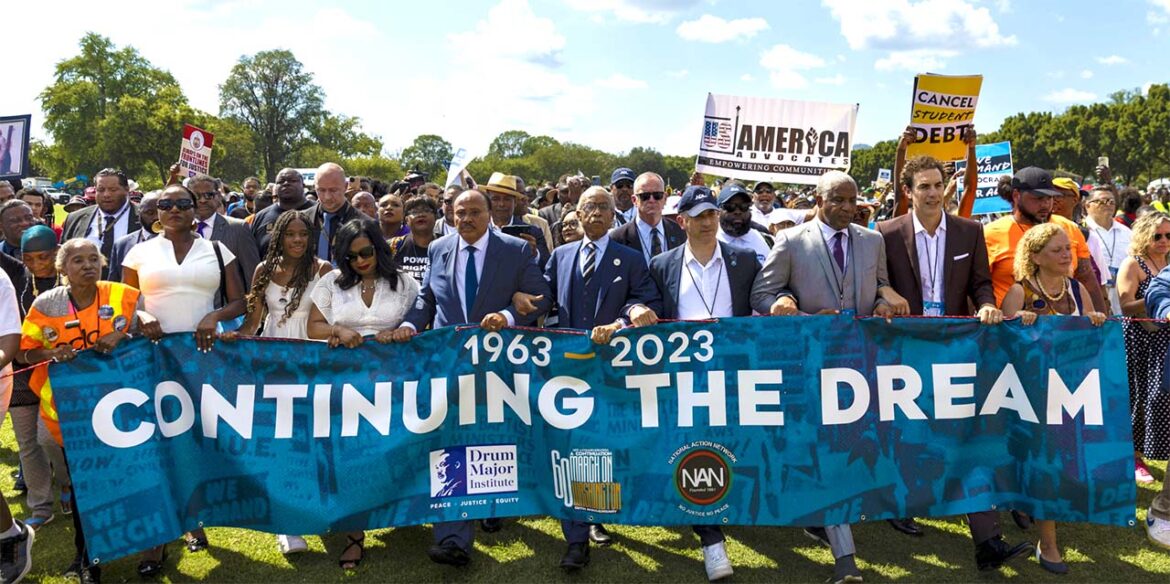Sixty years after the historic March on Washington for Jobs and Freedom led by the Rev. Martin Luther King Jr., thousands of people once again converged at the Lincoln Memorial on a sweltering August day to reaffirm the urgency of King’s dream and to voice concerns about the erosion of his hard-fought gains.
The echoes of the past were undeniable as marchers from various corners of the country gathered at the site where Martin Luther King Jr. stood in 1963, united by the belief that the progress made in the last half-century is at risk due to court rulings, legislative actions, and growing political extremism.
The event, commemorating the original march on August 28, 1963, was not simply a nostalgic remembrance but a resolute declaration that the demands made back then are still very much relevant today. The day-long rally was marked by impassioned speeches from leaders of civil and human rights organizations, as well as representatives from various other sectors.
Martin Luther King III, the eldest son of the civil rights icon, expressed deep concern over the direction the nation is headed. He emphasized the need to protect democracy, voting rights, the rights of women and children, and to end the scourge of gun violence. He echoed his father’s words, expressing hope that by addressing these issues, the nation could become truly great.
The event saw speakers from diverse backgrounds, including Sacha Baron Cohen, known for his satirical character Borat, and Robert Kraft, the owner of the New England Patriots football team. Labor leaders, activists, politicians, and civil rights veterans all took their turns on the podium.
Among the distinguished speakers was Andrew Young Jr., one of the last surviving civil rights leaders of his generation who was present at the 1963 march. He reminded the crowd of the power of the vote as a passport to freedom and urged them to focus on progress rather than dwelling on challenges.
Rev. Al Sharpton, founder of the National Action Network, rallied the crowd with his signature call-and-response chant of “No Justice! No peace!” He stressed the ongoing struggle for voting rights and the importance of maintaining the hard-won victories of the past.
The march drew a diverse range of participants, including college students, retirees, members of Black sororities and fraternities, and even some who had attended the original march in 1963. Signs demanding an end to voter suppression, immigration reform, and LGBTQ+ rights were prominently displayed among the crowd.
As the day progressed and temperatures soared, attendees listened to speeches, sharing a common commitment to advancing civil rights. The march held special significance for Avril Trancoso, a Black immigrant who had traveled from Brooklyn, as she reflected on the continued threat to Black progress.
The 2021 assault on the Capitol symbolized to many the ongoing challenges to democracy. The ease with which insurrectionists breached the seat of government underscored the need to address these threats head-on.
Denorver Garrett Jr. made a statement by carrying an 80-pound wooden cross, calling attention to the urgent need to address gun violence. The names of gun violence victims were scrawled in heavy black ink on the cross, a stark reminder of the lives lost.
Students from Claflin University in Orangeburg, S.C., and young people from different walks of life also made their presence felt, emphasizing the importance of education and the preservation of accurate history.
The march culminated with a march to the Martin Luther King Jr. Memorial, where the legacy of the civil rights leader was commemorated with a commanding statue overlooking the Tidal Basin.
The event, convened by the Kings’ Drum Major Institute and the National Action Network, was a testament to the ongoing struggle for equality and justice. While progress has been made over the past 60 years, speakers and participants alike emphasized that much work remains to be done.
Saturday’s march not only honored the legacy of Martin Luther King Jr. and the original marchers of 1963 but also served as a rallying cry for future generations to continue the fight for a just and equitable society. The challenges may have evolved, but the spirit of resistance and determination remains as strong as ever.


